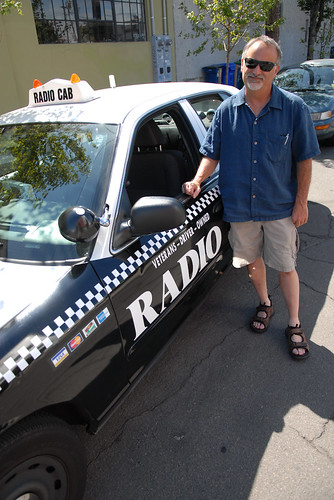For the second legislative session in a row, the Oregon Senate has voted in favor of a bill that would allow taxicab operators to use hand-held cell phones while driving.
Oregon’s existing cell phone law (ORS 811.507) permits the use of hands-free mobile devices while driving, but taxi operators want to be added to the list of exceptions for hand-held phone use that already includes police officers, public safety workers, farm equipment operators, transit workers, public utility workers, tow truck operators, HAM radio operators, and others.
Senate Bill 167 passed by a vote of 18-12 last month (all 12 “no” votes were from Democrats). A similar bill passed the Senate in 2013, but failed to get a vote in the House.
At a Senate committee hearing for SB 167 in February, Darin Campbell, a lobbyist and driver for Portland-based Radio Cab who initiated the bill, said giving cabbies the ability to use their phones while driving is crucial to their business. While he estimated that around 90-95 percent of taxi drivers use bluetooth and wireless hands-free systems, the law still needs to change.
“The goal isn’t to allow someone to talk to their wife or mother in the car… It shouldn’t be a five minute phone call, it should be a 15-second phone call every great once-in-a-while.”
— Darin Campbell, Radio Cab lobbyist
“It’s the people that aren’t using that technology, and when it fails to work, that’s who we’re looking to cover with this change,” Campbell testified to lawmakers on the Senate Business and Transportation Committee back in February.
Campbell, whom I reached on the phone for an interview (yes, he was driving when we spoke), says it’s a straightforward bill that will make it easier for cab operators to find customers.
When asked about safety implications of the new law, Campbell told me he doesn’t think it’s much of an issue. “I just don’t see this being such an overwhelming increase in cell phone use outside of what it is now.” He added that as head of Radio Cab’s safety committee he reviews every collision their drivers are involved in. “In the last five years,” he said, “we haven’t had a single one related to cell phone use.”
Campbell also said cab drivers are experts at staying focused on the road. “Cab drivers are wired for distraction,” is how he put it. The way Campbell sees it, the bill is meant to give taxi drivers another tool to locate customers, not give them a green light to chat away while they navigate busy streets. “The goal isn’t to allow someone to talk to their wife or mother in the car… It shouldn’t be a five minute phone call, it should be a 15-second phone call every great once-in-a-while.”
Advertisement
“But a taxicab driver could simply pull over to the side of the road and make his phone call if he doesn’t have the wireless device. I cannot support this.”
— Sen. Rod Monroe
But there’s no way law enforcement will know who the person is talking to or how long they’ve been on the phone.
“If drivers are going to take advantage of the law,” Campbell said “They’re doing it anyway right now.”
Interestingly, the bill didn’t pass in 2013 because some lawmakers in the House were uncomfortable with the idea of a cab operator talking on his or her cell phone while a passenger was in the back seat. That prompted an amendment to SB 167 which states that the law will not apply, “if there is a passenger in the taxicab.”
Turns out lawmakers identify with the risks of distracted driving when they imagine themselves riding in a cab with a cell-phone using driver. But what about other road users outside the car who might also be impacted by this law?
Senator Rod Monroe (D-Portland) voted against the bill. In the committee hearing he made his opinion very clear: “Driving while talking on a phone is a dangerous activity. Police, fire, perhaps maybe sometimes needs to do that… But a taxicab driver could simply pull over to the side of the road and make his phone call if he doesn’t have the wireless device. I cannot support this.”
The bill was sponsored by Senator Brian Boquist, a Republican from a rural district. In an email to BikePortland he said risks of distracted driving are decreasing as hands-free devices improve (according to NHTSA, it’s the talking that’s dangerous, not the use of hands). Boquist said the real risk is distracted police officers.
Although it was drafted prior to Portland’s experiment to allow Uber and Lyft, the law would likely not apply to those drivers because they are not yet clearly defined in statute.
Campbell says he’s confident the bill will pass this time around.
SB 167 is scheduled for a public hearing on April 29th in the House Committee on Transportation and Economic Development.



